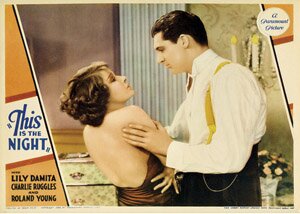The series of Thin Man movies answers the question, “What does happily ever after look like?”
Subversive Preston Sturges and Morgan’s Creek
Eddie Bracken just looks funny. It’s not in a physically distorted way; it has something to do with the innocent, cherubic quality of his face that makes you smile. And when he starts moving? You start to laugh.
Playing it straight: The Lady Eve
I foolishly put a poll on Facebook asking people what movie they felt was Preston Sturges’ best. It was foolish because I used the word “best” when I should have used “favourite” or some other word. How can you pick a “best” Sturges when there are a fistful of movies that could vie for the top with legitimacy? However … as it turns out, though a very small sampling, tied at the top of the results were Sullivan’s Travels and …
Continue reading
Lily Damita, Roland Young and This is the Night
Without intending to, I caught This is the Night on TCM last night and I was delightfully surprised. It was funny, curious and also interesting historically in that it was the first full feature movie Cary Grant ever appeared in. It was directed by Frank Tuttle, a man I know best for having directed This Gun For Hire that starred Veronica Lake.
 This is the Night (1932)
This is the Night (1932)
Directed by Frank Tuttle
To get the Cary Grant aspect out of the way, you can tell it’s an initial effort. His performance is good sporadically. Often he overplays it, though in one way it works because the film is a farce. You can see, however, the beginnings of what he would later become, especially his comedic skills.
But this movie is really Lily Damita’s and Roland Young’s. (The movie also stars Charles Ruggles and Thelma Todd.)
An athlete (Grant) returns from the Olympics. While he was away, his wife (Todd) has been involved with another man. As that other man, Roland Young must try to cover up the affair. With the help of a friend, Ruggles, he hires a heavily accented actress (Damita) to pretend she’s his wife.
It’s a relationship comedy – quite a funny one – and it is filled with sexual jokes. (The movie was made pre-Code.) For example, a recurring joke in the movie involves Todd whose dress keeps getting removed accidently by the chauffeur/butler. There are verbal jokes as well, such as Damita’s character who doesn’t understand English well, and ends up interpreting hints as, “I live in sin. I am naughty,” when Young tries to tell her to say she’s from Cincinnati.
It’s silly, yes, but lots of fun. It’s not exactly a screwball comedy; it’s a bit too farcical for that. But you can see the beginnings of screwball (just as you can see lingering hints of the silent era in the visual humour, as mentioned in this review).

What I found curious, and a little off-putting, was what I initially thought was a technical mistake in the broadcast but later saw was deliberate. It was this: much of the film occurs in Venice and much of that is at night. Every time the action occurs outside, at night, the screen goes blue.
Yes, it’s a colour that suggests night but in a movie that is otherwise black and white it’s a jarring and unnecessary effect. A quick online look revealed no reference to this so I don’t know if this was something the original movie tried or was added later. But I do know I would remove the effect.
Apart from that, This is the Night is a very fun and funny movie; it even has some nice romantic elements, not to mention Cary Grant’s movie debut. I was glad I found it.
As an aside, Cary Grant would work with Roland Young again a few years later in the movie Topper (1937).
As another aside, Lily Damita was married to Errol Flynn for a number of years and later married to Michael Curtiz. Her Hollywood career was relatively brief. She essentially got out of acting in movies when she married Flynn.
This cockeyed caravan: Preston Sturges defends fluff
I watched Sullivan’s Travels (1941) yet again last night because, as the main character John L. Lloyd ‘Sully’ Sullivan (Joel McCrea) says:
“There’s a lot to be said for making people laugh. Did you know that’s all some people have? It isn’t much, but it’s better than nothing in this cockeyed caravan.”
The words, of course, are from Preston Sturges, writer and director of the movie. This movie is, for me, the best of Sturges — though it’s really hard to say one is better than another when you consider movies like The Lady Eve, The Miracle at Morgan’s Creek and others.
If you’ve ever seen the Coen Brothers’ O Brother, Where Art Thou? you may be interested in knowing Sullivan’s Travels is where that title came from. It’s the movie Sullivan, a Hollywood director of light, comedic fluff, a man with a well-to-do, somewhat privileged background, wants to make. It’s to be a serious movie about how tough and awful this life is with, “…Bodies piling up in the street.” It’s to be, “A true canvas of the suffering of humanity!”
As his producers point out, what would he know about it? Realizing the truth in what they say, he sets off to find out, decked out like a tramp (from the wardrobe department) and with only ten cents in his pocket.
Unfortunately for Sullivan, despite his best efforts he keeps ending up in Hollywood.
In the third act, however, when he has finally given up his quest, that’s when he actually stumbles into the “trouble” he’s been trying to discover.
A plot summary does little to communicate why this movie is so good.
To begin with, it’s incredibly funny with the humour finding two sources: visual (slapstick) and verbal (witty dialogue). For slapstick, see the chase scene with the kid driving the rigged up “go-cart.” For dialogue, see the scene near the beginning where Sullivan argues for his idea with the producers (“But with a little sex!”).
While very funny (and a romance to boot, with Veronica Lake), it’s a satire of movie makers, particularly of the Hollywood variety. Some even argue that Sullivan’s Travels is the best movie ever about making movies. I think, however, Sturges’ satire goes beyond movies to culture overall.
His complaint is that comedy, and fluff generally, gets dismissed because, being light and agreeable when well done, it isn’t serious, or what we consider to be serious. A history of comedy at the Oscars gives credence to his complaint. It’s ignored when it comes to the “serious” categories like Best Picture.
I think his argument is two-fold: 1) audiences, on the whole, prefer lighter films — comedy, action, etc., and 2) the people who make the serious ones about such topics as homelessness, have no idea, no experience, no real understanding of what they are making a movie about. For one thing, the very people those films are sympathetic to, and that they stand morally side by side with, are the very people they show disrespect to by dismissing the kinds of films they like.
There’s a fabulous speech prior to Sullivan heading out to “learn something about trouble,” meaning homelessness. It’s made by Robert Greig as Sullivan’s butler Burroughs. He says he doesn’t think the plan is a good one because Sullivan has no clue about what poverty is: it’s not some romantic condition to be discovered but something virulent to be avoided. I think this is Sturges saying there is often a patronizing, even parasitic element to serious films and the subjects they treat. That’s probably far too extreme a view, but I think there is an element of truth in it. It makes for an interesting question though: can something not truly lived, something only experienced in a kind of vacation mode, meaning briefly, truly be understood? How often do we bring our assumptions about what something is, assumptions that come from a very different perspective, into our assessments and treatments, such as a in a film?
Of course, the movie doesn’t come across as pontificating, as the above makes it sound. It’s great fun, incredibly funny and with a beautiful Veronica Lake, romantic too. And even if the overall sentiment and the closing lines sound a bit cornball to us, I think it’s a legitimate view and never more passionately expressed as in Sullivan’s Travels.
I’ll have to watch the Coen’s O Brother, Where Art Thou? again because I’m now wondering if they were not only agreeing with Sturges and his argument in comedy’s favour but doing so by making Sullivan’s intended movie, one about a serious subject as done by a patronizing, uninformed fool? My guess is yes.


